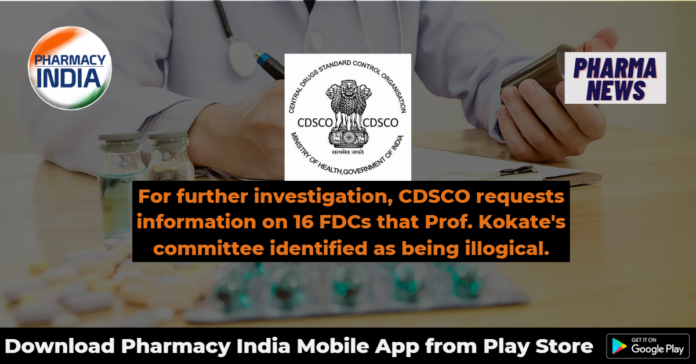All makers of the 16 fixed dose combinations (FDCs) that were previously deemed to be illogical in a report by an expert panel have been requested by the Central Drugs Standard Control Organization (CDSCO) to submit the information in the prescribed format for additional review. The decision is related to the one made at the 86th meeting of the Drugs Technical Advisory Board (DTAB) on April 13, 2021, which looked at the report of the expert committee led by Prof. Kokate about the FDCs deemed to be illogical. The meeting recommended that the sub-committee led by Dr. Nilima Kshirsagar, Emeritus Scientist and Former Chair in Clinical Pharmacology, ICMR, Mumbai, examine the 16 irrational FDCs in detail in accordance with the procedures. The meeting in general agreed with the recommendations of the Committee.
The Subcommittee has asked that the manufacturers and other stakeholders submit the information in the specified manner in order to give the chance to the manufacturers of the aforementioned FDCs and the concerned stakeholders to present the precise facts with regard to these FDCs. In its most recent notice, the CDSCO published the format that must be submitted with the necessary supporting papers in order for further action to be taken. The FDC division of CDSCO issued the following request: “Accordingly, all the manufacturers of said FDCs and the concerned stakeholders are hereby requested to submit the information in the prescribed format and the relevant supporting documents in hard copy as well as soft copy (i.e., in C.D form) to this office latest by April 30, 2023 until 5 pm.”
The format for submitting information requests information such as the applicant’s name and address, the name and designation of the licencing authority, the date and year of the product licence, whether the FDCs is approved by the Drugs Controller General (India), whether the FDC is pre-1988 and details thereof, the specifics of the drug, its indications, a copy of the approved package insert that is currently provided, and more, among other things, pharmacokinetic and pharmacodynamic rationality, regulatory status of the FDC in other countries, therapeutic details, a one-page summary with the highest level of evidence supporting the claim of hypothesised advantage or reasoning, etc.
Among the 294 FDCs suggested by the Prof. Kokate Committee, there are 16 FDCS on the list that are deemed to be irrational. These include the combination of acetyl salicylic acid and ethoheptazine, aloe extract with allantoin, alpha tocopherol acetate, D-panthenol, and vitamin A, aloe extract with vitamin E, dimethicone, and g Aloe vera combined with citrus oil, jojoba oil, wheat germ oil, and tea tree oil, as well as vitamin E and herbal extracts; Dicyclomine with paracetamol, clidinium bromide, and chlordiazepoxide; Gliclazide with chromium picolinate; Dicyclomine with paracetamol, clidinium bromide, and chlordiazepoxide; Amoxicillin with serratiopeptidase, lactobacillus sporogenes, cloxacillin, and serrapeptase, cefadroxil with probenecid, and cefurosime with serratiopeptidase are some examples of antibiotics that contain this enzyme.
In response to complaints, the DCG(I) prepared a list of 294 FDCs, and as part of follow-up action, the DCG(I) issued instructions to all State and Union Territory drug controllers to withdraw these 294 drugs that were licenced without the approval of the central drug regulator. In the year 2007, the drug regulator received complaints from Consumer Associations regarding FDCs not approved by the DCG(I) that were marketed in the country. However, in regards to the orders, the manufacturers association was granted a stay by the High Court of Madras. The DTAB was subsequently tasked with handling the situation at its 56th meeting, which took place on January 16, 2008, and the Board established a subcommittee to look into these FDCs. According to the sub committee report, out of the 294 FDCs, 17 were found to have insufficient data provided by the manufacturer to support their rationality, safety, and efficacy, while 49 were found to require additional data generation in terms of safety and efficacy by way of conducting clinical trials and other studies.
The Prof. Kokate Committee was given permission by the central government to take on these concerns, and after it has finished its work, its report may be presented to the DTAB for any additional necessary action. A further three FDCs were also ordered to be referred to the Prof. Kokate Committee by the High Court of Maharashtra, Nagpur Bench. The Committee then analysed these 17+49+3 FDCs and divided them into three groups: 16 FDCs that were thought to be illogical, 20 FDCs that needed more data to be generated, and 33 FDCs that were regarded reasonable. It is suggested that the illogical combinations not be permitted for their continuous production and promotion in the nation.
In its 86th meeting, the DTAB reviewed the report from the Committee dated March 12, 2021, and agreed to the suggestions in general. Additionally, it was advised that the subcommittee headed by Dr. Nilima Kshirsagar look over the 33 reasonable FDCs and the 20 FDCs that require additional discussion right away to check for any inconsistencies before reporting back to the DTAB Chairman. The subcommittee, however, will thoroughly review the 16 illogical FDCs in accordance with the preceding procedures, it was said.




